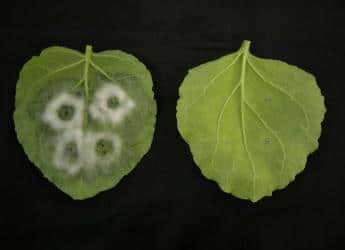
Late blight remains a critical challenge for potato growers worldwide — under favourable environmental conditions losses from this disease can hit as high as 100 per cent.
In a recent webinar presented by the World Potato Congress (WPC), Ivette Acuña from Chile shared groundbreaking work being done in Latin America to combat late blight through the implementation of an early warning system aimed at enabling sustainable and preventive management practices.
Acuña emphasized the importance of potatoes as a staple crop, where family farming plays a significant role in livelihoods and food security. The webinar highlighted the re-emergence of late blight as a pressing concern, exacerbated by climate instability and pathogen variability. In these changing conditions, the need for effective mitigation strategies has never been more critical.
Understanding Late Blight
Late blight, caused by the pathogenic fungus Phytophthora infestans, affects potato plants at all stages of growth. Symptoms can impact not only leaves and stems but also tubers, resulting in severe economic repercussions for growers. The environmental conditions that favour the disease —temperatures between seven to 25 degrees Celsius, high humidity, and prolonged leaf wetness — are becoming more prevalent due to climate change.
As Acuña pointed out, traditional management practices may no longer suffice in the face of such challenges. Therefore, innovative approaches are essential to safeguard potato production in the region.
Innovative Approaches to Management
The project, launched in collaboration with several countries including Chile, Argentina, Ecuador, and Panama, focused on the development of an early warning system tailored specifically for family farmers. The primary objective was to create a platform that would enable risk management and guide potato producers in making informed decisions based on real-time data about disease threats.
Key components of the initiative included rigorous monitoring of Phytophthora infestans using a novel symptom collection method with FTL cards. This approach allowed researchers to identify disease presence and alert growers quickly. Additionally, evaluating the susceptibility of various potato cultivars provided critical insight into developing effective resistance strategies.
“We witnessed a remarkable increase in growers’ understanding of environmental conditions that could lead to late blight,” Acuña said in her presentation. “This awareness enables them to take proactive measures and adjust their practices accordingly.”
Demonstrating Efficacy Through Collaboration
The project fostered close partnerships between researchers and farmers, allowing for the dissemination of knowledge and practical application of the early warning system. Acuña explained how this cooperative framework facilitated ongoing dialogue, helping farmers adapt their strategies based on real-time alerts and proven best practices.
As a result, many participating farmers reported a substantial reduction in fungicide application, leading to a decrease in chemical usage and environmental impact of over 50 per cent. Not only did this proactive approach preserve crop yields, but it also fostered a greater sense of sustainability within the farming communities involved.
Looking Ahead: Sustainable Practices for Potato Growers
The expertise shared by Acuña underscored the pressing need for continuous monitoring and adaptation in potato cultivation. As climate-related challenges persist, it is imperative for potato growers to adopt innovative solutions that prioritize sustainable practices. The development of robust early warning systems, paired with focused cultivar resistance efforts, can significantly enhance the resilience of potato production in Latin America.
Looking to the future, Acuña emphasized that ongoing cooperation across countries and sectors will be vital in sharing knowledge and building the capacity necessary to address common challenges.
“We must keep exchanging information and best practices,” she said. “Together, we can make significant strides towards improving productivity and ensuring food security.”
This proactive work serves as a powerful reminder of the importance of innovation, education, and collaboration. Adopting these models of shared knowledge and practical application can empower growers to protect their crops and contribute to a more sustainable future for global food security.
As Ivette Acuña’s work illustrates, the fight against late blight is not just about protecting potatoes; it’s about securing livelihoods and ensuring that future generations can benefit from this vital crop.
Catch a recording of the full webinar on the WPC website.
The post Early Warning System for Sustainable Potato Blight: Lessons from Latin America appeared first on Seed World.



